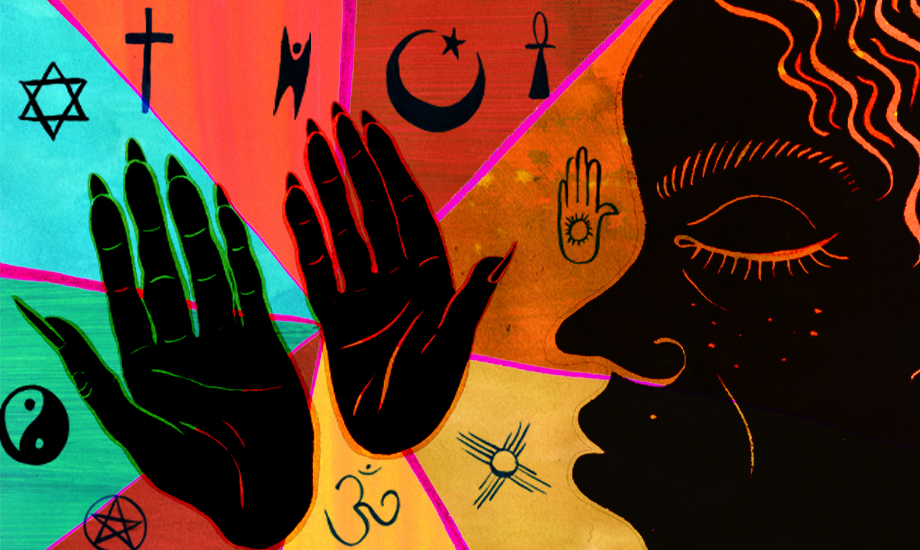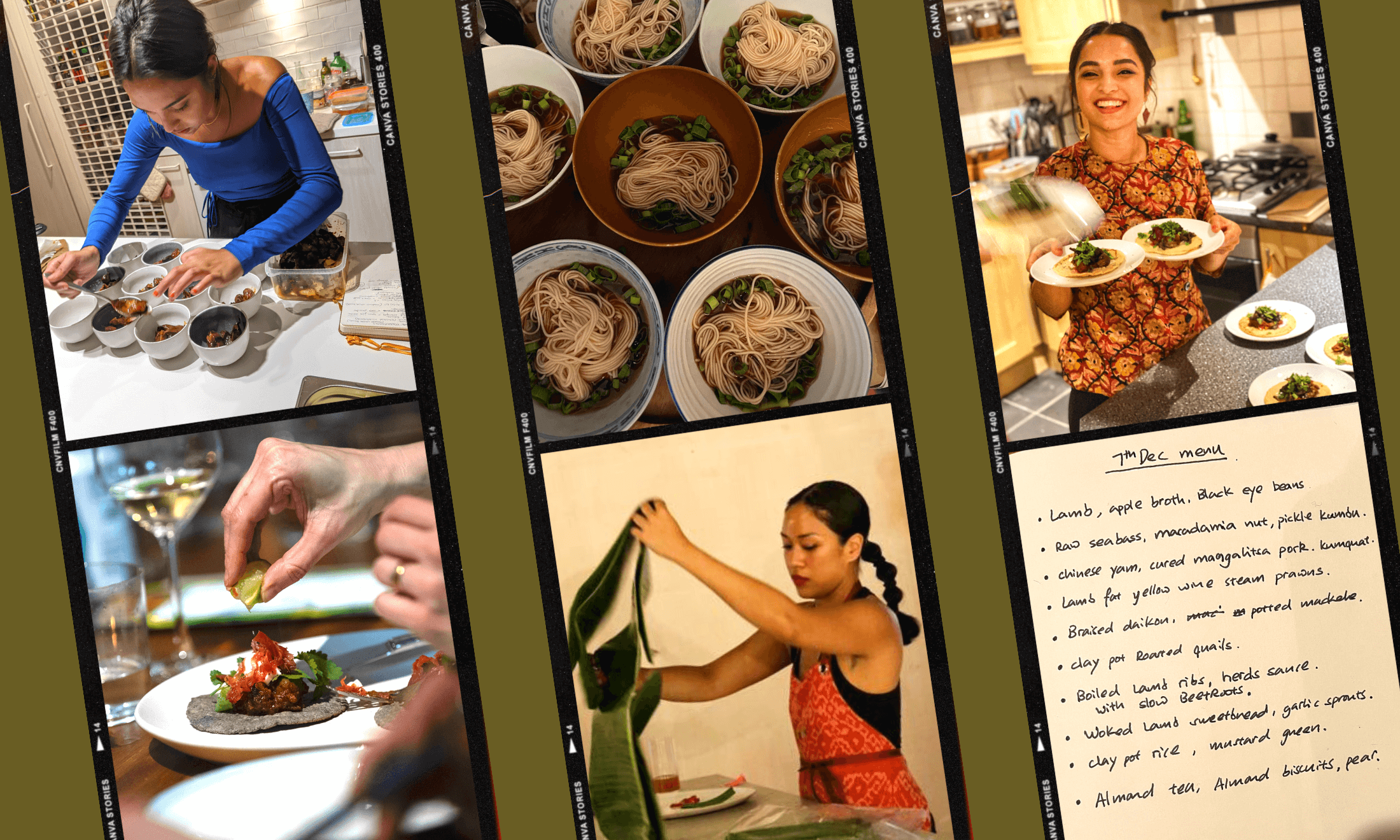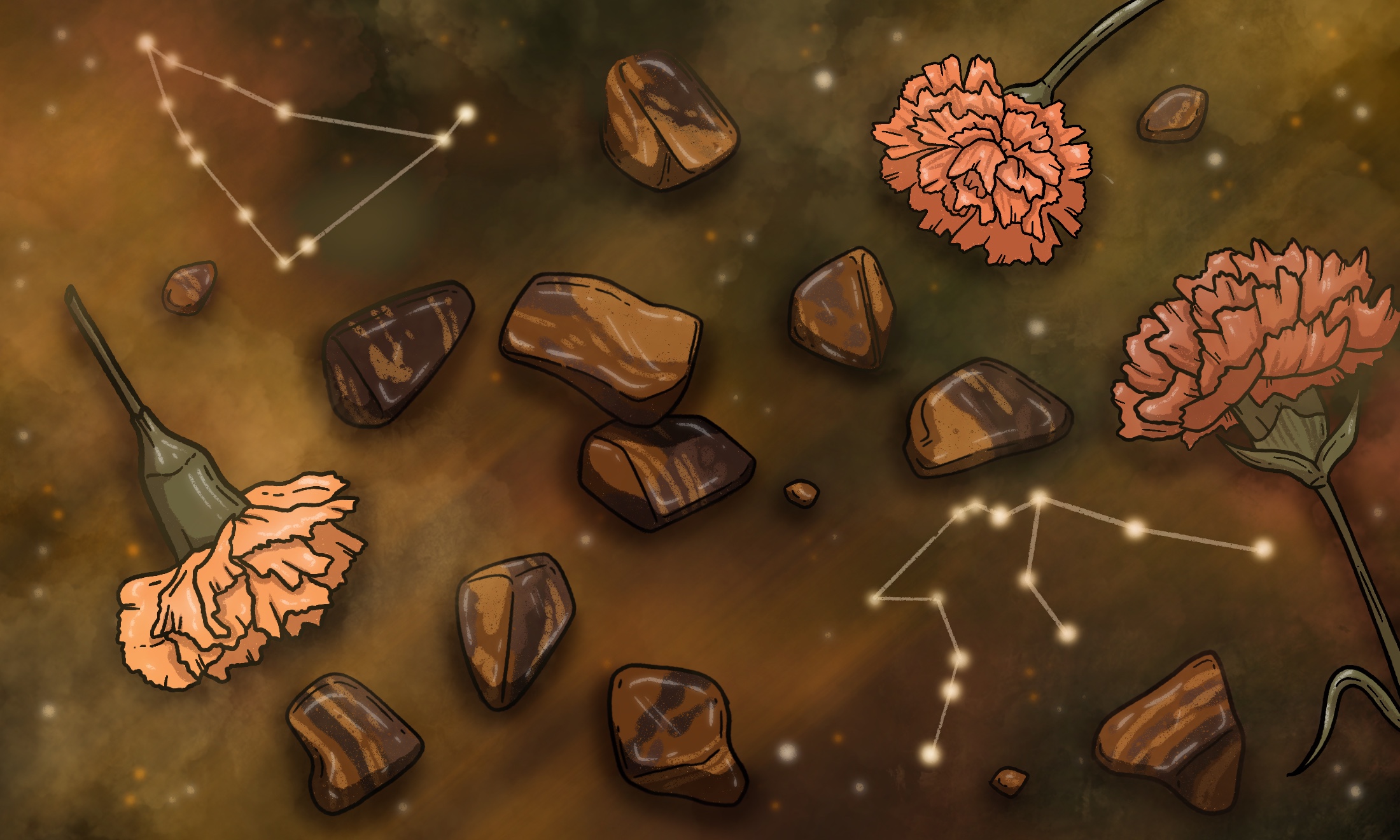‘I communicate with my own divinity’: what spiritual practices look like when you’re Black and queer
When religious and spiritual practices don’t always feel like they were made for you, how do you find ways to pray?
Rosel Jackson Stern
30 Jun 2021

Illustration by Tessie Orange-Turner
The assertion that religion and spiritual practices are too colonial and homophobic to supper Black queer existence is a partial truth that can sow deep roots. It’s one of the reasons prayer felt like an alien concept to my body, a bet on something intangible and deeply unaffordable. For a long time, my resistance to prayer was defiant: the world, with all its aches and pains, was never going to force me to my knees. Now that it’s integral to my daily practice, I wonder what it’s like for others in my community. Whether we find stillness in nature, in the communing with our ancestors or solace in the rhythm of our breath, prayer can become a soulful practice when we make it our own.
When I speak to film-maker and anti-racism researcher, Emmanuelle Drews, who is currently exploring tarot, she shares a discomfort in prayer that may reside in the same neighbourhood as my own. “It’s like, how dare you feel that anyone’s listening? That definitely comes up for me,” she explains from her parent’s flat in London. “Praying is such a vulnerable thing and a testament to feeling uncomfortable,” she recognises. “[When I do it] I just want to get it out and finish it, even if I’m doing it in my head.”
“I do my best to read my daily devotion and speak to God as often as I can in the mornings and before I go to bed.”
KG
Emmanuelle describes hearing other people pray during workshops and community events and observing how at ease everyone else seems with the practice. Overcoming the vulnerability to prayer while connecting to Spirit can feel performative like there’s an experience she’s supposed to achieve. “If I can’t do that, then there’s a shame over that insufficiency or feeling like I’m lacking.”
Feeling most comfortable in prayer before starting a tarot reading, Emmanuelle is finding her feet. “I’ll sit down and close my eyes and then say the prayer in my head. I address it to my honourable ancestors and divine Spirit.” Despite how confronting prayer can be, Emmanuelle’s spiritual practice gives her great peace and reassurance. “It’s the thing that’s made me think, ‘Oh, you do know what’s going on. You are aware and you just have to listen to that little light [within you]. If you just give it some attention and space, you’ll be ok’.”
This sense of grounding is one that Juliet Atto, a Ugandan-Swedish journalist, describes feeling in her yoga practice. “As humans, we’re very good and denying ourselves happiness and peace of mind. For me it’s still a challenge to have consistency in my practice, to know that this is my normal.”
When Juliet discovered her queerness, she moved away from the Catholic faith she’d inherited. Yet, prayer was where she found solace as a child. “I realised very early on that I liked girls and that conflicted me a lot. I didn’t experience any homophobia at home thankfully but I just couldn’t connect to the idea of Christianity.” It took Juliet until 2018 to discover yoga as her spiritual practice. “I needed to completely rearrange my life, “ she tells me on a sweltering Stockholm summer afternoon, via video call. “It completely changed everything for me.”
“I’ll sit down and close my eyes and then say the prayer in my head. I address it to my honourable ancestors and divine Spirit”
Emmanuelle Drews
From there she started meditating every day and pairing it with long walks in nature. “It helps to ground me — just being near a body of water and breathing consciously.”
Soothing herself has become part of what makes Juliet’s spirit slow down. “When I’m meditating, I feel like I’m praying,” she explains. “I’m not doing the Father, Son and Holy Ghost thing but I [meditate] it every morning and night to connect to spirit and to show gratitude. Prayer is about all of those things.” She conjures her reality through affirmations spoken out loud: “I do mantras where I look at myself in the mirror with one hand on my heart and one on my stomach. Usually, I’ll say, ‘I’m aligned with my highest self and give thanks for being divinely guided on the path of my purpose.’”
In her spirituality, Juliet is reconnecting to those lost to her on the physical plane. She’s come to develop a relationship with her great grandmother and grandmother that further tethers her to her essence. “In my family tree, the branches are just so broken and I don’t even know their names. But during the Blue Moon last year, I lit a candle for them and since then I’ve been talking to them,” she says with reverence in her voice. “I feel them manifested in me. It’s impossible for me to give thanks without mentioning them specifically.”
With deep ancestral proprioception, Adéọlá Adérè̩mí has never doubted her spiritual power. While taking down her braids in her apartment in Brussels, she shares her rituals with me. “I will wake up every morning and sing to my Ori,” she tells me. “I sing for an hour and then I sit and hold my head. In Yoruba culture, it’s very important to be connected to your head, which is your Ori, so I pray to God and then pray to myself: Ma jẹ ki ori inu mi ba tode mi jẹ. The English language is limited but it loosely translates to: ‘may my inner head never be in conflict with my outer head’”.
“In Yoruba culture, it’s very important to be connected to your head, which is your Ori, so I pray to God and then pray to myself”
Adéọlá Adérè̩mí
As the founder of a storytelling platform for Black women called Distinguished Diva, a reiki healer and spiritual teacher, faith flows through Adéọlás life like water. Raised in a multifaith family, her great grandmother was a Shango priestess and practising Ifá in her household was normal. “All of this is interdependent,” she notes. “I observe Ramadan as much as I love Christmas and going to church, singing in praise and worship”. Organised religion has given her the ability to recognise the inherent divinity within her. “Whether I was a Christian, Muslim or now as a practising Ìṣẹ̀ṣe, I communicate with the divine. I communicate with my own divinity and I allow for it to go before me before I start any day.”
There is no room for doubt when you know where and whom you come from. For Adéọlá specifically, her ancestral knowledge means that she knows who is in her corner. “It means I have no imposter syndrome because I know that I’m doing what I’m supposed to be doing,” Adéọlá asserts. “I move through the world knowing the power that I hold. I move through the world knowing that there are responsibilities to that power.”
Exploring her spirituality has embued Adéọlá with refreshing integrity and self-assuredness. “I don’t believe in love and light because it ignores the fact that people can move mad,” she says. Moving away from toxic positivity, Adéọlá understands the breadth of her spirit. “[It’s about] knowing how to use my voice and transmute my rage so that it doesn’t control me, but is respectfully sent back to the people who need to be slapped in the face. That’s how my spirituality shows up.”
Her practice allows her to honour her boundaries, something that’s just as pivotal as showing appreciation and gratitude. “I have to honour my divinity, even when other people don’t.” With conviction, she says: “I can be the thunder that will strike you down but I can also be the mothering, kind and loving friend that honours and nurtures you.”
London law student and musician KG Folas has always felt the presence of God, even if her values didn’t always align with the church she practised in. When she goes home to her Canadian protestant church, she manages to have grace for her community while challenging misogyny and homophobia. “Why, when God says that we’re all created equal, am I being treated differently?” she asks.
Now she finds community in her group of mostly queer friends. “We discuss our varying beliefs, contradictions in the Bible and why some of us have moved away from religion entirely.” This space has become a place where KG can hold the duality of faith, she tells me. “We talk through that and just being okay with having those conversations and truths about what Christianity has done to a lot of queer people,” she explains.
Giving praise unto God is still an important practice for KG, who now identifies as a nondenominational Christian. “I do my best to read my daily devotion and speak to God as often as I can in the mornings and before I go to bed. At night, as I’m lying in bed I’ll remember what I did that day and recite the verse I read that morning. It fills the space with gratitude and love. Then I wrap it up with ‘in Jesus name, Amen’.”
“I don’t believe in love and light because it ignores the fact that people can move mad”
Adéọlá Adérè̩mí
Prayer becomes a moment for KG to pour back into herself and her loved ones for the benefit of all she comes in contact with. “I pray for my family to stay good. I pray for friends who might be having a tough time. Especially in this season of change, I ask for guidance on the next steps a lot. I pray for the motivation to keep going and to keep putting good into the world.”
Discovering her queerness never precluded KG’s faith, a feat that holds a remarkable commitment to her faithfulness. “I’m not even sure why I didn’t just give up [Christianity]. During bouts of depression, God became my life jacket at that time.”
A spiritual practice, including prayer, is what we do when the seemingly broken pieces of our lives lie scattered on the floor. It is what allows our boats to dock when choppy internal oceans rock our beings. Far from incongruous with our identities, Black queer faith allows us to explore the reality that oppression is not all there is. Our spiritual practice is whatever helps us remember our essence, whatever revives our deepest joys. In remembering the sacredness of Black queer identity, the wonder of our beings is nothing short of divine.







